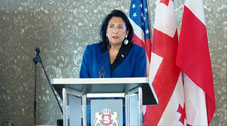
President Zourabichvili opens conference, speaks importance of self-government
By Liza Mchedlidze
Monday, October 24, 2022
The President of Georgia, Salome Zourbichvili, opened the international conference of the Local Self-Government Platform of Georgia "Efficiency and Challenges of Local Self-Government in Georgia" and addressed the Polish, American, Canadian and Israeli guests.
"The issue of self-government is one of the crucial issues of our future. If we want democracy, Europeanism and a strong state, we need strong regions - there won't be strong regions and there won't be a strong state, a strong Georgia!" said the President in her speech.
According to him, in order for the region to be strong, self-government should be real, put into practice and not remain only as a good legal framework and strategy.
"The issue of self-government is one of the crucial issues for our future. If we want democracy, Europeanism and a strong state, we need strong regions. This is a situation we cannot escape from. There will be no strong regions and no strong state, strong Georgia! Greater attention to regions - this has been one of my top priorities since day one, but attention alone is not enough.
In order for the region to be strong, self-government must be real, put into practice, and not just a good legal framework and strategy. A lot has been done in this direction, but most importantly, the region should be self-governing in practice, the municipality should be self-governing, which requires several preconditions, but if we do not do this, we cannot return to our traditional arrangement.
Georgia was strong when the self-governing units (then it was not called self-governing) were strong and were together. This unity, self-government and their independence is our niche. This arrangement of our state was broken by the Soviet system, it moved us to an ultra-centralized system and thereby destroyed what was the foundation of our strength, which we must return to. We have the initial guidelines for this: we have adopted the "Self-Government Code".
However, all is not done yet; We have adopted a decentralization strategy, which needs to be implemented in three main directions - everything starts and ends with finance, if there is no new distribution of income, there will be no self-government either because it will not have the resources to implement its own decisions. Therefore, we should go further in this direction.
Second, there is the issue of transfer of property to self-governments, which is also written in the new code but has not yet been fully implemented, and which is one of the foundations of the strength and new opportunities of municipalities.
And thirdly, there is the issue of citizens' involvement in the process of decision-making and budget allocation, which is also very important. This practice has already been introduced in several municipalities. In some places on a very small scale, in others a little more seriously, but this still only covers projects such as squares, sculptures, etc. It is not the citizen's full involvement in the processes that have become a true partner of self-government. The steps to be taken toward this require everyone's involvement. So, there is a lot to do," said the president.
The platform is organized by the Solidarity Fund PL (SFPL) branch in Georgia and the Association of Financiers of Local Self-Governing Units of Georgia (GFA).
Representatives of the Ministry of Finance, Ministry of Infrastructure and Regional Development of Georgia took part in the event.
The participants of the conference discussed the best strategies for the effective management of local problems and the best international practices.
The main task of the platform is to assign priority strategies to Georgia's self-government bodies, which will allow them to better serve their citizens, improve sustainability, and better guide the collective vision of local self-government in Georgia. In addition, the platform aims to transfer financial and budgetary SOPs to local self-governing units.

